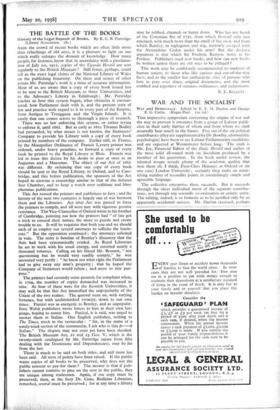THE BATTLE OF THE BOOKS History of the Legal Deposit
of Books. By R. C. B. Partridge. (Library Association. 18s.) AMID the crowd of recent books which are often little more than rehashings of old ones, it is a pleasure to light on one which really enlarges the domain of knowledge. How many people, for instance, know that in accordance with a proclama- tion of July 1st, 1912, copies of the Uganda Herald are sent regularly to the British Museum ? Still fewer, perhaps, could tell us the exact legal claims of the National Library of Wales on the publishing fraternity. On these and scores of other points Mr. Partridge's work is a mine of accurate information. Most of us are aware that a copy of every book issued has to be sent to the British Museum, to three Universities, and to the Advocate's Library in Edinburgh ; Mr. Partridge teaches us how this system began, what obstacles it encoun- tered, how Parliament dealt with it, and the present state of law and practice with regard to it in every part of the Empire, from Antigua to Trengganu and the Virgin Islands. It is rarely that one comes across so thorough a piece of research. There was no law enforcing this system, or rather trying fo enforce it, until 1662. But as early as 16xo Thomas Bodley had persuaded, by what means is not known, the Stationers' Company to. provide his Library with a copy of every book printed by members of the company. Earlier still, in France, by the Montpellier Ordinance of Francis I, every printer was ordered, under heavy penalties, to forward a copy of every book he printed to the Royal Library at Blois. Francis was led to issue this decree by his desire to pose at once as an Augustus and a Maecenas. The object of our Act of 1662 was different. By ordaining that one copy of every book should be sent to the Royal Library, to Oxford, and to Cam- bridge, and this before publication, the sponsors of the Act hoped to exercise a censorship similar to that of the defunct Star Chamber, and to keep a watch over seditious and blas- phemous publications. This Act roused the printers and publishers to fury ; and the history of the next two centuries is largely one of war between them and the Libraries. Act after Act was passed to force the printers to comply, and all were met with vigorous passive resistance. The'Vice-Chancellor of Oxford wrote to his brother of Cambridge, pointing out how the printers had " of late got a trick to conceal their names, the more to puzzle and create trouble to us. It will be requisite that both you and we should each of us employ our several attorneys to sollicite the busin- esse." But the opposition continued ; the attorneys solicited in vain. The story is familiar of Bentley's discovery that the Acts had been systematically evaded. As Royal Librarian he set to work with his usual energy, and extorted nearly a thousand volumes. Calling on his friend Mr. Bennett, " not questioning but he would very readily comply," he was answered very pertly : " he knew not what right the Parliament had to give away any man's property ; that he hoped the Company of Stationers would refuse ; and more to this pur- pose." The printers had certainly some grounds for complaint when, in 1709, the number of copies demanded was increased to nine. As four of these were for the Scottish Universities, it may well be that this Act intensified the unpopularity of the Union of the two realms. The quarrel went on, with varying fortunes, but with undiminished vivacity, down to our own times. Panizzi was as energetic as.Bentley, and as unpopular. Irate Welsh publishers wrote letters to him in their own lan- guage, hoping to annoy him. Panizzi, it is said, was urged to answer them in Italian. One English publisher, writing to The Times, stuck to the vernacular : " Sir, in the name of a sorely-tried section of the community, I ask who is this d—d Italian." The dispute may not even yet have been decided. The British Museum Act, 22 and 23 Geo. V, which is the twenty-ninth catalogued by Mr. Partridge (apart from fifty dealing with the Dominions and Dependencies), may be far from the last.
• There is much to be said on both sides, and still more has been said. All sorts of points have been raised. If the public wants copies of all books to be preserved, why does not the public consent to pardor them ? The answer is that if pub- lishers cannot contrive to pass on the cost to the public, they are unique among tradesmen. Again, if one copy must be preserved, then, as the fiery Dr. Coxe, Bodleian Librarian, remarked, several must be preserved ; for at any time a library may be robbed, cheated, or burnt down. Who has not heard of the Cottonian fire of 1731, from which Beowulf only just emerged, with much more than the smell of fire on it, and from which Bentley, in nightgown and wig, narrowly escaped with the Alexandrine Codex under his arm? But the decisive argument is that which Sir Frederic Kenyon notes in his Preface. Publishers need new books, and how can new books be written unless there are old ones to be pillaged ?
This work may be confidently recommended to students of human nature, to those who like curious and out-of-the-way facts, and to the smaller but enthusiastic class of persons who love to pore over dates, original documents, and the most crabbed and repetitive of statutes, ordinances, and judgements.
E. E. KELLETT.


















































 Previous page
Previous page